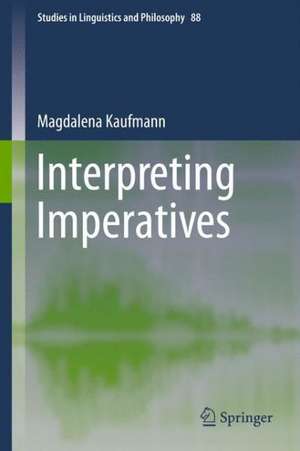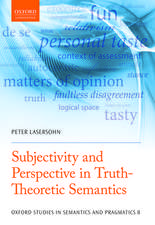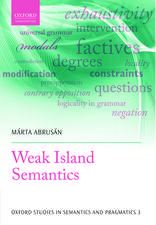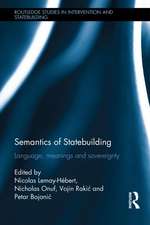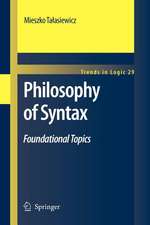Interpreting Imperatives: Studies in Linguistics and Philosophy, cartea 88
Autor Magdalena Kaufmannen Limba Engleză Paperback – 29 noi 2013
Imperatives have been viewed as elusive components of language because they have a range of functions that makes them difficult to unify theoretically. This fresh view of the semantics-pragmatics interface allows for a uniform semantic analysis while accounting for the pragmatic versatility of imperatives.
| Toate formatele și edițiile | Preț | Express |
|---|---|---|
| Paperback (1) | 632.28 lei 38-44 zile | |
| SPRINGER NETHERLANDS – 29 noi 2013 | 632.28 lei 38-44 zile | |
| Hardback (1) | 732.21 lei 6-8 săpt. | |
| SPRINGER NETHERLANDS – 27 oct 2011 | 732.21 lei 6-8 săpt. |
Din seria Studies in Linguistics and Philosophy
- 15%
 Preț: 583.78 lei
Preț: 583.78 lei - 18%
 Preț: 728.43 lei
Preț: 728.43 lei - 20%
 Preț: 1918.99 lei
Preț: 1918.99 lei -
 Preț: 393.35 lei
Preț: 393.35 lei - 18%
 Preț: 1219.29 lei
Preț: 1219.29 lei - 18%
 Preț: 733.78 lei
Preț: 733.78 lei - 20%
 Preț: 563.41 lei
Preț: 563.41 lei - 20%
 Preț: 509.80 lei
Preț: 509.80 lei - 15%
 Preț: 645.28 lei
Preț: 645.28 lei - 18%
 Preț: 723.69 lei
Preț: 723.69 lei - 18%
 Preț: 1552.05 lei
Preț: 1552.05 lei - 18%
 Preț: 953.65 lei
Preț: 953.65 lei - 15%
 Preț: 647.27 lei
Preț: 647.27 lei - 18%
 Preț: 959.98 lei
Preț: 959.98 lei - 18%
 Preț: 1832.39 lei
Preț: 1832.39 lei - 15%
 Preț: 646.30 lei
Preț: 646.30 lei - 18%
 Preț: 953.03 lei
Preț: 953.03 lei - 18%
 Preț: 1224.06 lei
Preț: 1224.06 lei - 18%
 Preț: 952.09 lei
Preț: 952.09 lei -
 Preț: 394.71 lei
Preț: 394.71 lei - 18%
 Preț: 942.01 lei
Preț: 942.01 lei - 18%
 Preț: 947.50 lei
Preț: 947.50 lei - 18%
 Preț: 955.70 lei
Preț: 955.70 lei - 18%
 Preț: 1223.43 lei
Preț: 1223.43 lei - 15%
 Preț: 653.00 lei
Preț: 653.00 lei - 15%
 Preț: 645.28 lei
Preț: 645.28 lei -
 Preț: 391.99 lei
Preț: 391.99 lei - 18%
 Preț: 942.01 lei
Preț: 942.01 lei
Preț: 632.28 lei
Preț vechi: 831.95 lei
-24% Nou
Puncte Express: 948
Preț estimativ în valută:
121.00€ • 131.39$ • 101.64£
121.00€ • 131.39$ • 101.64£
Carte tipărită la comandă
Livrare economică 18-24 aprilie
Preluare comenzi: 021 569.72.76
Specificații
ISBN-13: 9789400737570
ISBN-10: 9400737572
Pagini: 284
Ilustrații: XII, 272 p.
Dimensiuni: 155 x 235 x 15 mm
Greutate: 0.4 kg
Ediția:2012
Editura: SPRINGER NETHERLANDS
Colecția Springer
Seria Studies in Linguistics and Philosophy
Locul publicării:Dordrecht, Netherlands
ISBN-10: 9400737572
Pagini: 284
Ilustrații: XII, 272 p.
Dimensiuni: 155 x 235 x 15 mm
Greutate: 0.4 kg
Ediția:2012
Editura: SPRINGER NETHERLANDS
Colecția Springer
Seria Studies in Linguistics and Philosophy
Locul publicării:Dordrecht, Netherlands
Public țintă
ResearchCuprins
1. Setting the Scene .- 2. How to Handle Imperatives in Semantics .- 3. Imperatives as Graded Modals .- 4. From Modalized Propositions to Speech Acts .- 5. Possibility Readings .- Embedding Imperatives .- References .- Index.
Recenzii
From the reviews:
“This book provides an analysis of imperatives that aims to unify the study of their linguistic form with that of their various potential uses. … A benefit of this book is that linguists of different areas may find it useful. Because it includes in-depth syntactic analyses of imperatives, as well as semantic and pragmatic ones, different chapters target different audiences. Most linguists interested in imperatives would likely find the whole book helpful … .” (Mary Johnson, The Linguist List, February, 2013)
“This book provides an analysis of imperatives that aims to unify the study of their linguistic form with that of their various potential uses. … A benefit of this book is that linguists of different areas may find it useful. Because it includes in-depth syntactic analyses of imperatives, as well as semantic and pragmatic ones, different chapters target different audiences. Most linguists interested in imperatives would likely find the whole book helpful … .” (Mary Johnson, The Linguist List, February, 2013)
Textul de pe ultima copertă
Imperative clauses are recognized as one of the major clause types alongside those known as declarative and interrogative. Nevertheless, they are still an enigma in the study of meaning, which relies largely on either the concept of truth conditions or the concept of information growth—neither of which are easily applied to imperatives. This book puts forward a fresh perspective. It analyzes imperatives in terms of modalized propositions, and identifies an additional, presuppositional, meaning component that makes an assertive interpretation inappropriate. The author shows how these two elements can help explain the varied effects imperatives have, depending on their usage context.
Imperatives have been viewed as elusive components of language because they have a range of functions that makes them difficult to unify theoretically. This fresh view of the semantics-pragmatics interface allows for a uniform semantic analysis while accounting for the pragmatic versatility of imperatives.
Imperatives have been viewed as elusive components of language because they have a range of functions that makes them difficult to unify theoretically. This fresh view of the semantics-pragmatics interface allows for a uniform semantic analysis while accounting for the pragmatic versatility of imperatives.
Caracteristici
Gives a uniform analysis for all occurences of the individuated form type Takes into account cross-linguistic findings Offers an explanation and application of clear criteria for identification of imperatives Draws on parallels to other natural language phenomena (e.g. context-dependence of modals)
